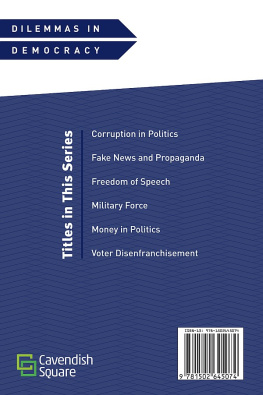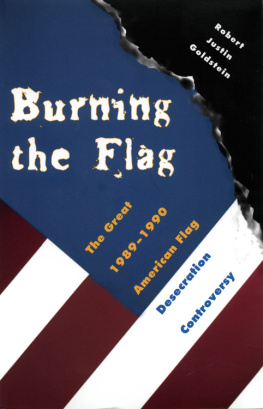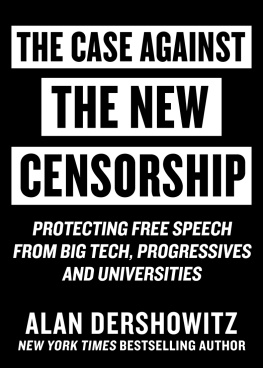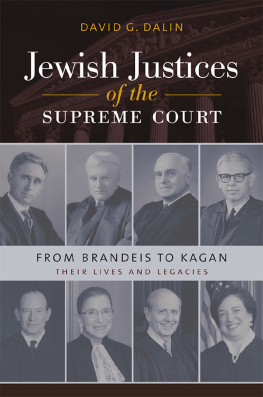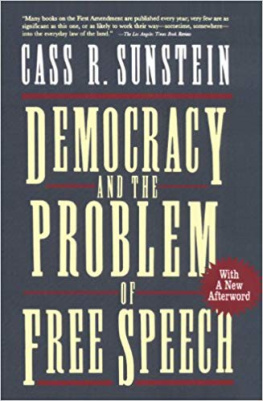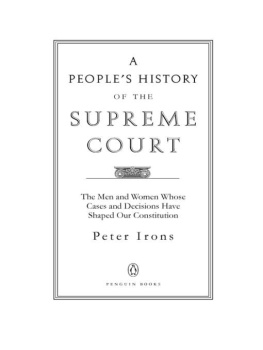Cover
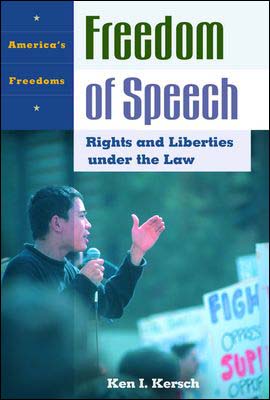
| title | : | Freedom of Speech : Rights and Liberties Under the Law America's Freedoms |
| author | : | Kersch, Kenneth Ira. |
| publisher | : | ABC-CLIO |
| isbn10 | asin | : | 1576076008 |
| print isbn13 | : | 9781576076002 |
| ebook isbn13 | : | 9781576076071 |
| language | : | English |
| subject | Freedom of speech--United States. |
| publication date | : | 2003 |
| lcc | : | KF4772.K47 2003eb |
| ddc | : | 342.73/0853 |
| subject | : | Freedom of speech--United States. |
Page i
Freedom of Speech
Page ii
Other Books in Americas Freedoms
Donald Grier Stephenson Jr., Series Editor
Cruel and Unusual Punishment, Joseph A. Melusky and Keith A. Pesto
Equal Protection of the Laws, Francis Graham Lee
Freedom of Association, Robert J. Bresler
Property Rights, Polly J. Price
The Right to Bear Arms, Robert J. Spitzer
The Right to Counsel and Privilege against Self-Incrimination, John B. Taylor
The Right to Privacy, Richard A. Glenn
Page iii
Freedom of Speech
Rights and Liberties under the Law
Ken I. Kersch

Santa Barbara, California Denver, Colorado Oxford, England
Page iv
Copyright 2003 by Ken I. Kersch
All rights reserved. No part of this publication may be reproduced, stored in a retrieval system, or transmitted, in any form or by any means, electronic, mechanical, photocopying, recording, or otherwise, except for the inclusion of brief quotations in a review, without prior permission in writing from the publishers.
Library of Congress Cataloging-in-Publication Data
Kersch, Kenneth Ira, 1964
Freedom of speech : rights and liberties under the law / Ken I.
Kersch.
p. cm. (Americas freedoms)
Includes bibliographical references and index.
ISBN 1-57607-600-8 (hardcover : alk. paper) e-book ISBN 1-57607-607-5
1. Freedom of speechUnited States. I. Title. II. Series.
KF4772.K47 2003
342.73'0853dc21
2003002634
ABC-CLIO, Inc.
130 Cremona Drive, P.O. Box 1911
Santa Barbara, California 93116-1911
This book is printed on acid-free paper.
Manufactured in the United States of America
Page v
For my students
Page vi
This page intentionally left blank
Page vii
To me the question whether liberty is a good or a bad thing appears as irrational as the question whether fire is a good or a bad thing? It is both good and bad according to time, place, and circumstance, and a complete answer to the question, In what cases is liberty good and in what cases is it bad? would involve not merely a universal history of mankind, but a complete solution of the problems which such a history would offer.
James Fitzjames Stephen
Liberty, Equality, Fraternity
Page viii
This page intentionally left blank
Page ix
Contents
Series Foreword xv
Preface xxv
1 Introduction
Institutional Protections for the Freedom of Speech,
Why Free Speech? First Amendment Theory,
ProFree Speech Arguments,
AntiFree Speech Arguments,
Free Speech Today,
References and Further Reading,
2 Origins and Early Development,
The Regulation of Speech under English Common Law,
Continuity and Change in the Colonies and Early American Law,
Founding Worries,
Speech in the Early National Era,
Fighting Words: The Duel in the Early United States,
The Main Currents of the Law of Speech in the Nineteenth-Century United States,
Robust Parties, Antislavery Agitation, and Speech in the United States,
Freedom and Civil War,
Page x
PostCivil War Doctrine: Thomas Cooleys Treatise and Free Speech,
The Eclipse of Privacy and Rise of Obscenity,
References and Further Reading,
3 The Twentieth Century
Free Speech as Bohemian Fashion,
Political Radicalism Prior to World War I,
The IWW Free Speech Fights,
The Birth Control Movement and Free Speech,
World War I, Free Speech, and the Supreme Court,
The Birth of Modern Free Speech Law: Schenck, Abrams, Debs, and Frohwerk,
Incorporation, the Red Scare, and the Rise of the Supreme Court as the Preeminent Authority on Free Speech Rights,
Speech and the U.S. Worker,
The Jehovahs Witnesses and the Development of the Public Forum Doctrine,
Monitoring the Movies: The Legion of Decency and the Hays Commission,
Welcoming Sexual Speech,
The Threat and Fear of Communism,
The Social Movements of the 1950s and 1960s,
Late-Century Progressive Attacks on Free Speech,
Doctrine and Issues at Centurys End,
References and Further Reading,
4 The Future of the Freedom of Speech
The Return of the Dangers of Radical Political Speech,
Government Largesse and the Freedom of Speech,
The Campaign Finance Controversy: Bribery or Constitutionally Protected Political Speech?
Private Power, Technology, and the Freedom of Speech,
Page xi
The New Public Health Censorship and the Continuing Progressive Political Correctness Campaign,
Globalization: Political Correctness by Other Means?
Conclusion,
References and Further Reading,
5 Key People, Cases, and Events
6 Documents
Peter Wentworth, Speech on the Liberties of the Commons (1576),
John Milton, Areopagitica (1644),
John Trenchard and Thomas Gordon, Of Freedom of Speech,
Benjamin Franklin, An Apology for Printers, Philadelphia Gazette (June 10, 1731),
Montesquieu, Spirit of the Laws, Book 12, Chapters 1213 (1748),
John Wilkes, The North Briton no. 45 (April 25, 1763),
William Blackstone, Commentaries on the Laws of England, Book 4, Paragraph 13 (1769),
Publius [Alexander Hamilton], Federalist Paper no. 84 (1787),
U.S. Constitution (1787),
Sedition Act (1798),
Letter, John Marshall to a Freeholder (1798),
James Madison, Report on the Virginia Resolution (1800),
Thomas Jefferson, First Inaugural Address, Washington, D.C. (March 4, 1801),
St. George Tucker, editor, Blackstones Commentaries: With Notes of Reference to the Constitution and Laws of the Federal Government of the United States; and of the Commonwealth of Virginia (1803),
Page xii
Alexander Hamiltons Speech in Harry Croswells Case (1804),
Joseph Story, Commentaries on the Constitution of the United States (1833),
Barron v. Baltimore, 32 U.S. 243 (1833),
Alexis de Tocqueville, Democracy in America (1833),
Gag Rule, U.S. House of Representatives (1836),
John Stuart Mill, On Liberty (1859),
Fourteenth Amendment, U.S. Constitution, Section 1 (1868),
Next page

